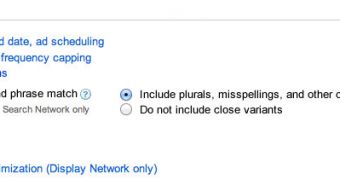Google is expanding the use of its misspelling and close variants technology to its ad business. Specifically, adwords users will now be able to target not only the keywords they use but also misspellings and other queries which are very similar and linked to the original keywords.
"Starting in mid-May, phrase and exact match keywords will match close variants, including misspellings, singular/plural forms, stemmings, accents and abbreviations," Google explained.
"Based on our research and testing, we believe these changes will be broadly beneficial for users and advertisers," it said.
Google will only target very close matches, so false positives should be very few. The technology that it uses for "did you mean" and more recently for replacing queries with the corrected ones is very accurate and it's the same one used in AdWords now.
Previously, advertisers had to run ads for misspelled keywords or for any variation of the keywords they wanted. It took a lot of time to create all of the variations, meaning more hassle for advertisers.
Smaller ones didn't go through the trouble, meaning they would lose potential customers plenty of times.
Google says about seven percent of queries are misspelled and longer queries fare even worse. In testing, Google has found that with the new matching behavior, clicks increased by three percent while cost-per-click remained the same.
"Even with perfect spelling, two people searching for the same thing often use slightly different variations, such as 'kid scooters' and 'kid’s scooter' or 'bamboo floor' and 'bamboo flooring'," Google explained.
There is also the option of disabling this feature if you don't want it. It should be popping up in the AdWords dashboard over the coming weeks, giving users the option of using the new feature or not. But the feature will only start being used about a month from now, in mid-May.

 14 DAY TRIAL //
14 DAY TRIAL //